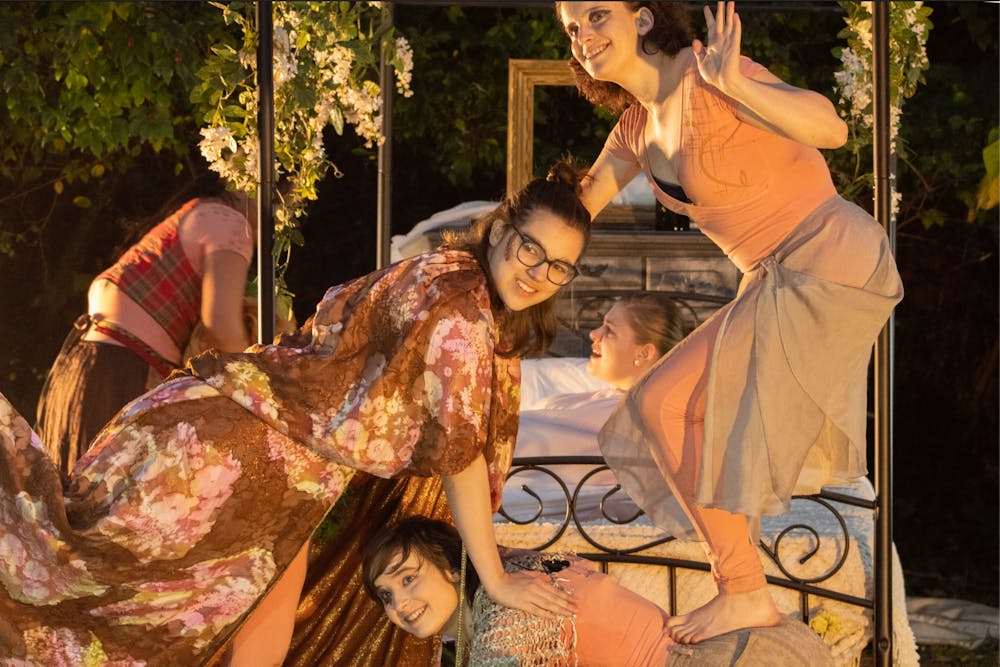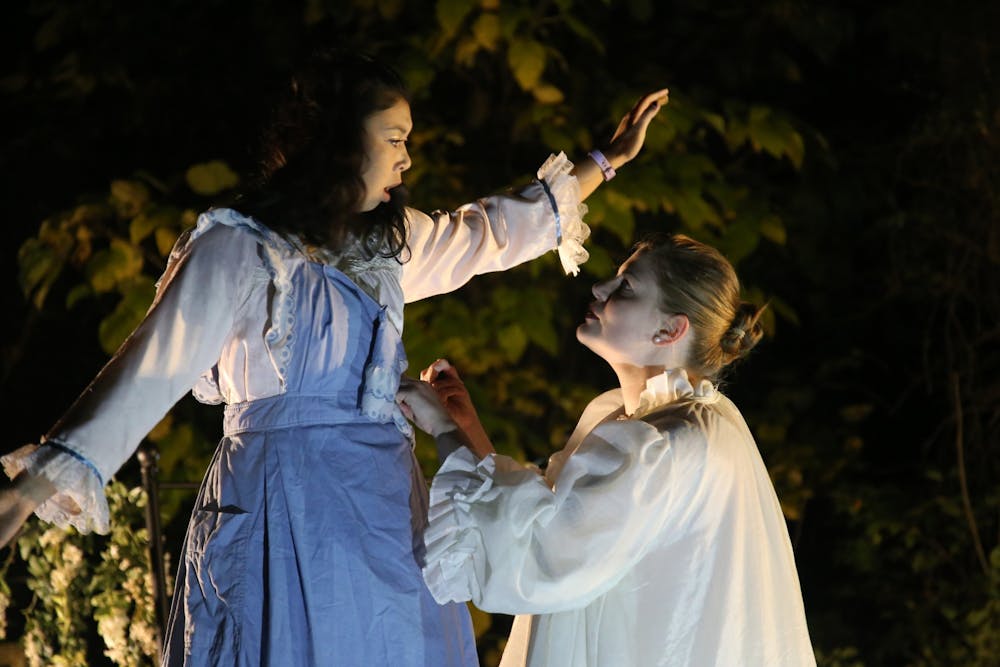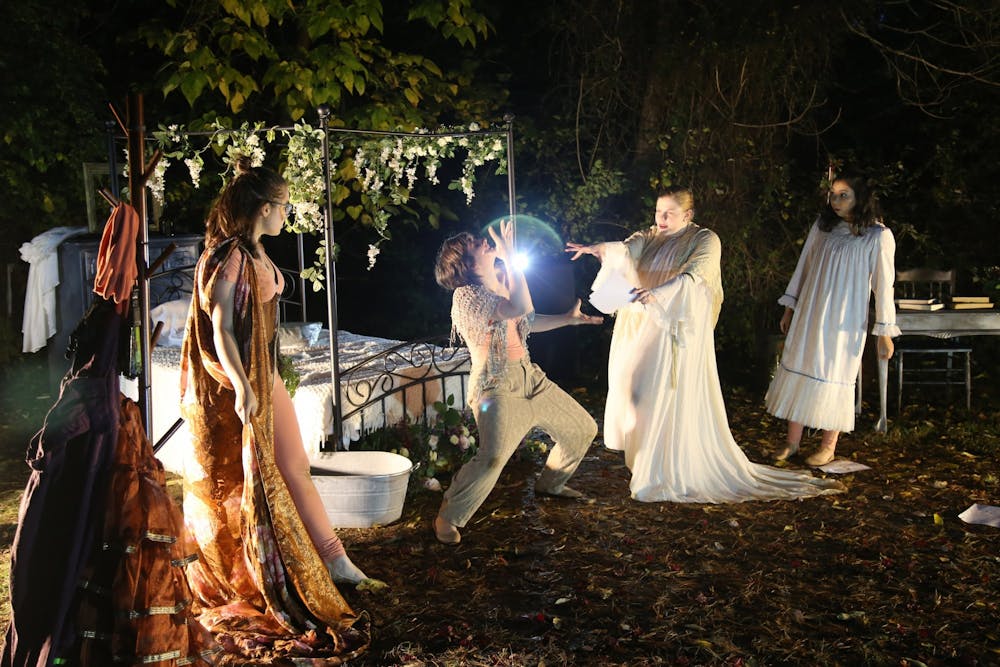This past semester, college students all over the world were faced with the decision of where and how they would spend the months away from campus. Many chose to rent out apartments or Airbnbs with friends in hopes of making the online class experience feel a bit more collegiate (and bearable). One group of Princeton students chose to use this time as a canvas for artistic expression, bringing a theatrical production to life from the backyard of their Airbnb. For months, the group planned and rehearsed tirelessly; last weekend, the fruits of their creative labors were finally revealed to the public.
The play, written by Emma Watkins ’18, could be described as an enrapturing mix of imaginative magic and historical truth. Paige Elizabeth Allen ’21 and Eliana Cohen-Orth ’21 chose to take on the play as their senior thesis, and the final production did not disappoint.
With its performance taking place completely outdoors, “Unbecoming” follows the story of Lady Charlotte Guest, a real figure from the 1800s, as she works to translate the collection of Welsh tales known as the “Mabinogion.” In Watkins’ refreshingly fantastical take on this true historical event, the audience experiences the characters of the “Mabinogion” as corporeal actors, allowing an intimate peek into the inner world of Charlotte’s mind as she becomes immersed in the stories she seeks to translate. Specifically, the work follows Charlotte’s translation of the tale of Blodeuwedd, a woman made from flowers by Llew for the definitive purpose of serving as his wife.
Allen is Head Prospect Editor Emerita for The Daily Princetonian.

Courtesy of Catherine Watkins
The play, initially intended to be performed from the stage of the Berlind Theatre, was pre-recorded and aired virtually on the Lewis Center for the Arts website, with live showings on Jan. 15, Jan. 16, and Jan. 17, followed by talkbacks with the cast and crew. From the audience’s perspective, the production can undoubtedly be regarded as a flourishing success, stunningly conveying themes of love, family life, autonomy, and feminine resilience, all grounded in one physical outdoor location. With such an uncommon process behind the success of this play, the two talkbacks allowed audience members to gain a deeper understanding of the show’s origins and creation.
In the first of these talkbacks, the cast and crew noted that the production process itself was a truly unique experience, both due to the outdoor video staging of a show initially intended for an indoor stage, as well as the cast’s constant proximity to one another. Eliyana Abraham ’23 reflected on how deepening her friendships with her peers actually made it easier to explore the characters, and her fellow actors seemed to share these sentiments.
In an interesting parallel to the content of the show itself (in which the characters of the Mabinogion’s stories enter the life of translator Charlotte Guest), Naomi Park ’21 stated that it was “interesting to see the world of the show enter the worlds of our lives.” Just as the characters of Charlotte’s translation entered not just her own life but also the lives of those around her, actor Hannah Wang ’21 told us how onlookers would often stop to observe the actors’ outdoor rehearsal process: “It felt like we were building the world’s most visible and most public secret… I don’t think I’ll ever have an experience like that again.”

Wang is a senior news writer for the ‘Prince.’
With all of its challenges and unpredictable components, the cast and crew’s passion and gratitude for their experience was evident throughout the talkback session. Nora Aguiar ’21, who took on the role of Blodeuwedd in addition to serving as the stage manager and sound engineer, summarized what seemed to be the group’s consensus: “It was a beautiful thing to be able to come together to make… what was a very intimate piece in the end.”

Courtesy of Catherine Watkins
The intimacy described by the show’s creators manifested in moments of honest vulnerability throughout the production, as the story explores what it means to have control over one’s own narrative and the injustice and pain that comes from having that control stripped away. In most tellings of the story, Blodeuwedd is condemned as an evil adulteress, but Charlotte, by opening her heart to listen to the character’s story, begins to understand Blodeuwedd’s complete lack of agency in her “marriage” and how she simply sought to be loved and love freely. (This transformation of perspective on the part of Charlotte is strikingly depicted through actual, scripted conversations between Charlotte and the character Blodeuwedd.) Yet, when her new lover is captured for trying to kill Blodeuwedd’s husband, he twists the narrative against Blodeuwedd, framing her as a perpetrator of evil and removing her agency to tell her own story.

The talkback following the Sunday matinee showing was hosted by actor and dramaturg Paige Allen. Watkins, the playwright, and Welsh translator and scholar Sioned Davies offered further historical context for the work, discussing the interesting theme of “a woman’s place.” Watkins recounted how the first seeds of her project were planted at Princeton when working on her senior thesis: “I pulled out Charlotte Guest’s translation and remember being surprised that this was the first translation that had been written by a woman and that it was done in the 1800s… I thought there must be a really incredible story there.”

Courtesy of Catherine Watkins
Alongside her mentor Sioned Davies, Watkins shared more information about the fascinating historical background of Charlotte Guest, a housewife torn between her desire to translate the “Mabinogion” and her desire to uphold her societal role as a Victorian housewife. Davies shared a few of Guest’s own words which convey her internal conflict concerning these desires: “‘It’s right I should now have done with authorship,’ she says, ‘if a woman is to do her duties the less she meddles with pen and ink the better.’” Although Charlotte has certainly set herself apart from women in her position, and though we might be tempted to think of her as some sort of Victorian feminist icon, Watkins does not think that this is something Charlotte would have wanted: “Charlotte was a very conflicted character. Would Charlotte have wanted to be considered a feminist? Probably not.”
Regardless, Watkins acknowledged the grit and resilience of feminine characters, a rarity for the time period, as one of the main reasons translators and storytellers continue to return to these Welsh tales. She described how many female characters in the tales seem “so contemporary, strikingly present, and constantly… relevant to contemporary conversations, and that's what draws me back. I think that's one of the reasons why these stories are so important.” It seems that Charlotte Guest, even if she did not realize it, was probably drawn to her work as a translator for these reasons as well.
In the talkback, Watkins explained how Charlotte Guest’s translating process was repeatedly impeded by her giving birth to children. Impressively, Charlotte did not allow these interruptions to waylay her prolific work as a translator. Though quite different from childbearing, the many creators behind this production encountered their own, pandemic-sized interruptions. The parallels between Charlotte Guest’s creativity despite her societal constraints and Princeton students’ commitment to this production despite impositions exemplify resilience and perseverance in a truly inspiring way.
The show is available here through Jan. 31.








